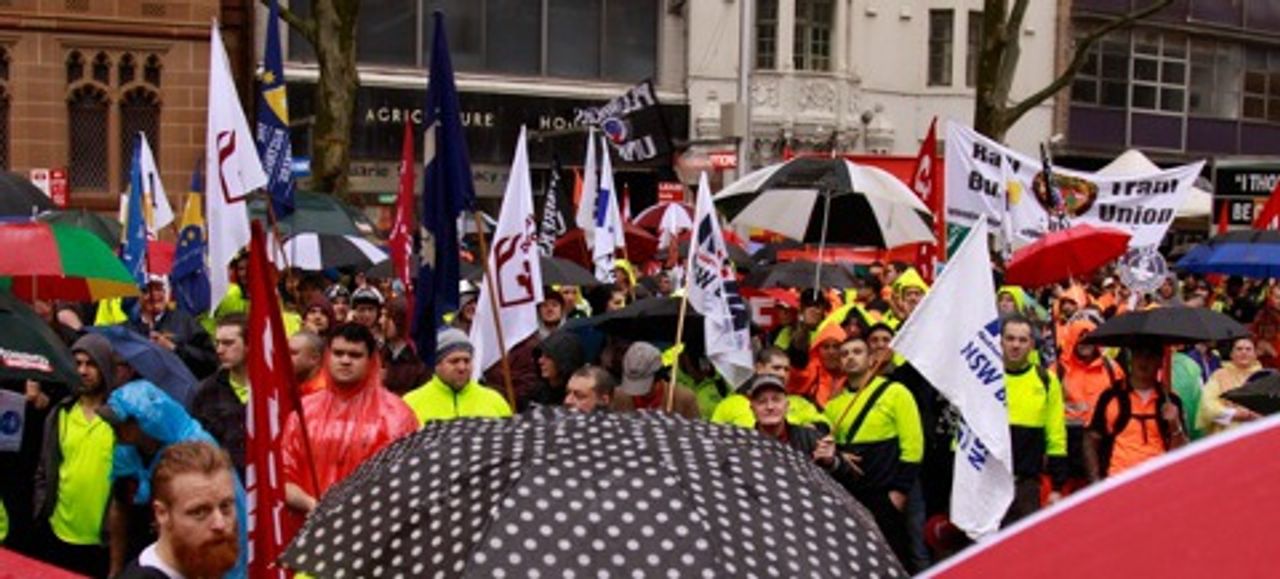About 3,000 workers rallied yesterday outside the New South Wales (NSW) parliament, with another protest of more than 1,000 in the regional city of Newcastle, to protest the state Liberal government’s assault on workers’ compensation.
Unions NSW, the peak union body, organised the rallies that were held the day after the state government released its annual budget. The event was a cynical attempt to divert the popular opposition to O’Farrell government’s attacks on workers’ compensation and its austerity measures.
The legislation, which is expected to pass the NSW parliament in two weeks, will reduce workers’ compensation to 95 percent of previous wages for the first 13 weeks (rather than the current 26 weeks), after which payments fall to 80 percent. Workers with “minor” injuries will receive no payments after five years. No compensation will be granted for injuries sustained travelling to and from work. Family members suffering from nervous shock would no longer receive entitlements.
Unions NSW secretary Mark Lennon chaired the Sydney rally and gave the main address. He falsely claimed that NSW had a “decent workers’ compensation system” for over 100 years, ignoring the major inroads made by previous state governments—Labor and Liberal—into the scheme.
 A section of the Sydney rally
A section of the Sydney rallyMost recently, the Council of Australian Governments, the umbrella body for state and federal governments, signed an agreement in 2008 to bring all workers’ compensation laws into line with a cost-cutting model drafted by the federal Labor government. In NSW, this placed the burden of proof onto workers—they now have to prove employer negligence rather than employers having to demonstrate they did all they could to prevent an injury.
The NSW budget that was released on Tuesday slashed 10,000 public-sector jobs and eliminated over 100 unspecified social programs (see: “NSW state budget axes thousands of public sector jobs”). None of the union officials addressing the event even mentioned the budget. State Labor opposition leader John Robertson spoke and made only a passing reference to the cutbacks.
The rally was designed to prevent any discussion by those attending. It opened with a chant and was followed by a rock band. Tom, an injured employee, was one of three workers allowed to address the protest. His comments provided a small glimpse of some of the conditions facing injured employees.
Tom told the rally that the personal difficulties and pressures of “not being able to work, not being able to be responsible for your kids” and the “constant worrying about money” was “punishment enough.” He continued: “If these changes are able to go through, they will add further stress onto families struggling to cope with day to day activities. I didn’t go to work to get injured, I went to work to come home to my family.”
Labor leader John Robertson attempted to posture as a defender of workers’ rights, falsely claiming that Labor would “do all we can” to fight the state government’s assault on workers compensation. He claimed he had “spent my working life” fighting for workers’ rights.
“I have stood here with many of you in this crowd and fought changes to workers’ compensation,” Robertson declared. He was referring to 15-hour blockade of the NSW parliament by workers in 2001, against the then Labor government’s moves to undermine workers’ compensation. (See: “Angry protest in Australia against Labor government changes to workers compensation”)
After the legislation was passed in the lower house in 2001, Robertson called off all further industrial action as “a sign of good faith” to the Labor government.
Robertson, the Labor Party and the unions will undoubtedly do the same again. The unions have put forward no perspective for an ongoing campaign against the changes to workers’ compensation or the budget measures. Instead they are promoting limited community actions to pressure local MPs.
Mark Lennon of Unions NSW closed the rally by calling on workers to send a sms text message to their unions, pledging to “not vote for a party that attacks workers compensation”. This remark exposes the real purpose of yesterday’s rally: to let off steam among angry workers, to confine the opposition to the single issue of workers’ compensation, and to call for a vote for Labor or the Greens at the next election.
That is why none of the speakers could mention the federal Labor government, which is propped up by the Greens, and its escalating assault on jobs, living standards and basic rights. The speakers were also completely silent on the regressive record of previous state Labor governments, which implemented savage attacks on essential programs and services, including to workers’ compensation.
Workers attending the rally spoke to World Socialist Web Site reporters.
Allan, an arborist, said: “We’re here because over the last few years our work force has been depleted. We don’t have as many workers in the field as what we should do, and it causes a lot of risk. Everyone’s lifting more weight and it’s a lot harder to work every day.”
“I climb trees for a living. Not too many people can do that, it’s a dangerous job. We’ve had the most deaths in our industry every year.”
He had little confidence that the unions would do anything to defend working conditions. When asked to elaborate, he replied, “What can they do? They can make a bit of noise.”
Sharon, an injured warehouse worker said: “I’m not allowed to return to my old job. I’m home at the moment. I’m currently supposed to be retrained but I’m still waiting. It’s been three years and I’m still waiting to be retrained.”
 Glenn
GlennSharon’s partner, Glenn said: “I think it’s becoming a worldwide thing—governments are trying to save money because the economy’s going down. Obviously it’s going on all over the globe and Australia usually follows suit.”
Sharon added: “Look at Europe, they’ve just gone down, their money... they’ve gone broke. Eventually we’re going to go that way too. You can see it happening here. Look at our superannuation. The government wanted everyone to put into super. Ok, so we did that, but there’s nothing left.”
Subscribe to the IWA-RFC Newsletter
Get email updates on workers’ struggles and a global perspective from the International Workers Alliance of Rank-and-File Committees.
